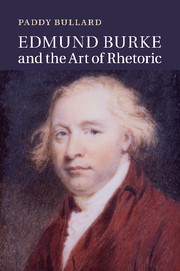Book contents
- Frontmatter
- Contents
- Acknowledgements
- Abbreviations
- Introduction: Burke, rhetoric and ethics
- 1 The ethical turn in early modern rhetoric, 1600–1760
- 2 Rhetoric in Ireland, 1693–1765
- 3 The Epicurean aesthetics of the Philosophical Enquiry
- 4 Episodes in the evolution of Burke's eloquence
- 5 Reflections on the Revolution in France and the rhetoric of character
- 6 Burke, Rousseau and the purchase of eloquence
- Conclusion
- Notes
- Bibliography
- Index
5 - Reflections on the Revolution in France and the rhetoric of character
Published online by Cambridge University Press: 01 June 2011
- Frontmatter
- Contents
- Acknowledgements
- Abbreviations
- Introduction: Burke, rhetoric and ethics
- 1 The ethical turn in early modern rhetoric, 1600–1760
- 2 Rhetoric in Ireland, 1693–1765
- 3 The Epicurean aesthetics of the Philosophical Enquiry
- 4 Episodes in the evolution of Burke's eloquence
- 5 Reflections on the Revolution in France and the rhetoric of character
- 6 Burke, Rousseau and the purchase of eloquence
- Conclusion
- Notes
- Bibliography
- Index
Summary
In Edmund Burke's most important work, Reflections on the Revolution in France (1790), the ethos-driven rhetoric that I have been describing assumes its defining form. More than ever before, Burke's personal assertion of his authority as a writer and thinker is connected in the Reflections with his general analysis of what good and bad political deliberation should be. The ethical bias of Burke's rhetoric, and particularly his discriminations between competent and unqualified speakers, has a complex relation to his ideas about the structure of states, and about their position within what he understands to be the divine, natural order of things. Although the art of rhetoric must play a small part in so large a scheme, it plays a central one in the structure of the Reflections.
This chapter begins by outlining the most important lesson of political pragmatics that Burke gives in the Reflections: that thinking and speaking well about government is a matter of acquiring (and being seen to have acquired) the right sort of knowledge of one's fellow citizens, and of using it to balance their powers and interests in political discussion. Burke holds that citizens have a sort of prescribed property in their public characters, and that a peculiarly refined discretion is required of those who would dispose that property in the state. Next, the chapter turns to other concepts used by Burke to delineate the intellectual processes of good deliberation, particularly the positive terms ‘reflection’ and ‘analogy’, and the negative terms ‘sophistry’ and ‘metaphysics’.
- Type
- Chapter
- Information
- Edmund Burke and the Art of Rhetoric , pp. 140 - 173Publisher: Cambridge University PressPrint publication year: 2011
- 1
- Cited by



